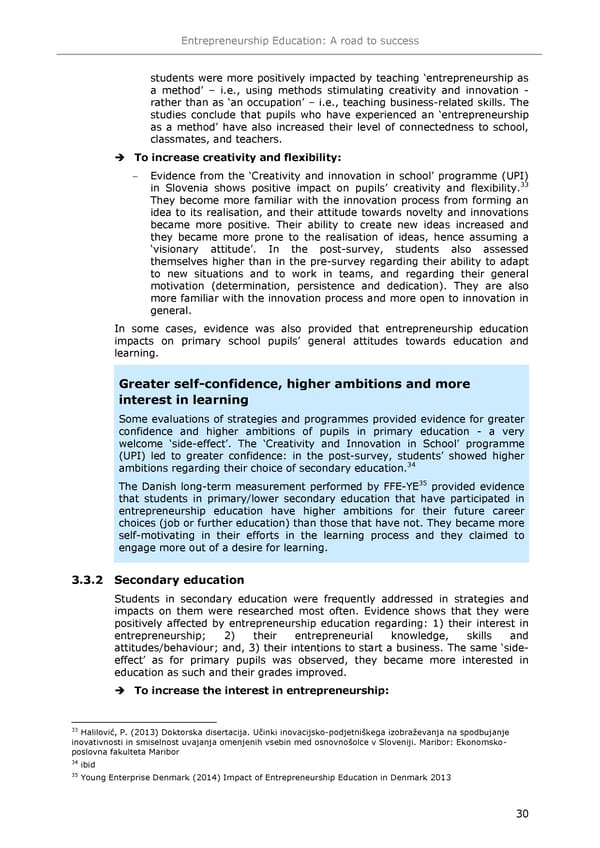Entrepreneurship Education: A road to success students were more positively impacted by teaching 8entrepreneurship as a method9 3 i.e., using methods stimulating creativity and innovation - rather than as 8an occupation9 3 i.e., teaching business-related skills. The studies conclude that pupils who have experienced an 8entrepreneurship as a method9 have also increased their level of connectedness to school, classmates, and teachers. To increase creativity and flexibility: Evidence from the 8Creativity and innovation in school9 programme (UPI) 33 in Slovenia shows positive impact on pupils9 creativity and flexibility. They become more familiar with the innovation process from forming an idea to its realisation, and their attitude towards novelty and innovations became more positive. Their ability to create new ideas increased and they became more prone to the realisation of ideas, hence assuming a 8visionary attitude9. In the post-survey, students also assessed themselves higher than in the pre-survey regarding their ability to adapt to new situations and to work in teams, and regarding their general motivation (determination, persistence and dedication). They are also more familiar with the innovation process and more open to innovation in general. In some cases, evidence was also provided that entrepreneurship education impacts on primary school pupils9 general attitudes towards education and learning. Greater self-confidence, higher ambitions and more interest in learning Some evaluations of strategies and programmes provided evidence for greater confidence and higher ambitions of pupils in primary education - a very welcome 8side-effect9. The 8Creativity and Innovation in School9 programme (UPI) led to greater confidence: in the post-survey, students9 showed higher 34 ambitions regarding their choice of secondary education. The Danish long-term measurement performed by FFE-YE35 provided evidence that students in primary/lower secondary education that have participated in entrepreneurship education have higher ambitions for their future career choices (job or further education) than those that have not. They became more self-motivating in their efforts in the learning process and they claimed to engage more out of a desire for learning. 3.3.2 Secondary education Students in secondary education were frequently addressed in strategies and impacts on them were researched most often. Evidence shows that they were positively affected by entrepreneurship education regarding: 1) their interest in entrepreneurship; 2) their entrepreneurial knowledge, skills and attitudes/behaviour; and, 3) their intentions to start a business. The same 8side- effect9 as for primary pupils was observed, they became more interested in education as such and their grades improved. To increase the interest in entrepreneurship: 33 Halilović, P. (2013) Doktorska disertacija. Učinki inovacijsko-podjetniškega izobraževanja na spodbujanje inovativnosti in smiselnost uvajanja omenjenih vsebin med osnovnošolce v Sloveniji. Maribor: Ekonomsko- poslovna fakulteta Maribor 34 ibid 35 Young Enterprise Denmark (2014) Impact of Entrepreneurship Education in Denmark 2013 30
 Entrepreneurship Education Page 33 Page 35
Entrepreneurship Education Page 33 Page 35